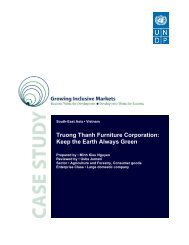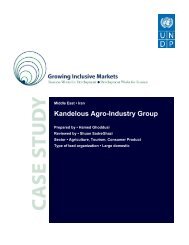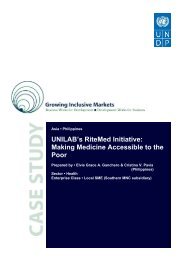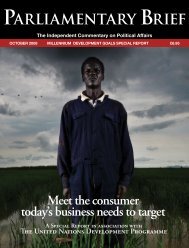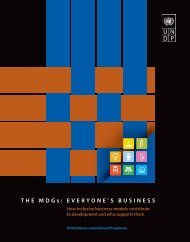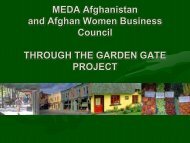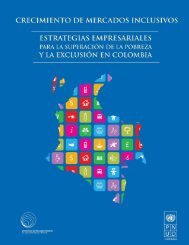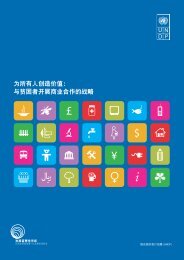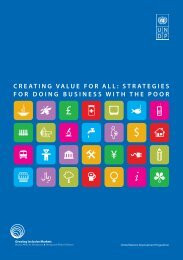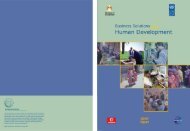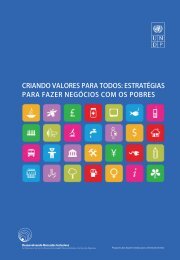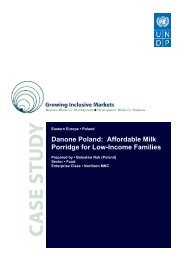Edipack: a Paper Recycling Pioneer - Growing Inclusive Markets
Edipack: a Paper Recycling Pioneer - Growing Inclusive Markets
Edipack: a Paper Recycling Pioneer - Growing Inclusive Markets
You also want an ePaper? Increase the reach of your titles
YUMPU automatically turns print PDFs into web optimized ePapers that Google loves.
Western Balkans • Albania<strong>Edipack</strong>: a <strong>Paper</strong> <strong>Recycling</strong><strong>Pioneer</strong>Prepared by • Iva Kleinova & Brigitte DuerrReviewed by • Aline KraemerSector • Consumer Products, Waste ManagementEnterprise Class • MSME
Executive Summary<strong>Edipack</strong> is a leading paper recycling and packaging material enterprise, located in one of themost environmentally hazardous places in Albania - the city of Durres. Mr. Bardhyl Baltezastarted <strong>Edipack</strong> to produce packaging material for his cosmetic business. In doing so, he wasable to transform a strong obstacle, namely the lack of production capacity of packagingmaterials and the high cost of imported raw material, into business opportunity.The company receives its inputs from small individual suppliers as well as from two wastemanagement companies. With the aim of including poor and vulnerable people in its supplychain and generating income opportunities for them, <strong>Edipack</strong> partners with three NGOs,which coordinate paper collection from about 120 individual collectors from vulnerablegroups. By employing and providing on-the-job training to 75 low-skilled employees in theproduction process, <strong>Edipack</strong> further contributes to social inclusion.<strong>Edipack</strong> produces a large variety of goods, including sheets of corrugated paper, sophisticatedpackaging materials such as cosmetics paper boxes and packaging for agricultural products orbeverages. The company currently has over 370 clients and sells its products to a variety ofbusinesses, the majority of which are small and medium sized Albanian enterprises.Having broken even in 2009 in spite of the crisis, <strong>Edipack</strong> is profitable today. The mainconstraints the company faced were barriers to access to finance, the lack of sector-specificknowledge and skills among its employees and the unfavorable regulatory environmentrelated to waste management and recycling that prevailed in Albania.In order to enhance the development and growth of its business, <strong>Edipack</strong> partnered withseveral developmental actors such as the International Finance Corporation (IFC), theEuropean Bank for Reconstruction and Development (EBRD) and United States Agency forInternational Development (USAID). These actors provided technical assistance, training andfinancial resources to <strong>Edipack</strong>.The main achievements of <strong>Edipack</strong>’s business model are threefold:• The business has become economically profitable and has a turnover of about 2million USD and a production of up to 350 tons of packaging materials per month. Itsperformance suggests potential for long-term growth.• In social terms, <strong>Edipack</strong>’s impact lies in the inclusion of individual paper collectors inits supply chain. The company buys approximately 600 tons of waste paper per monthfrom around 120 small suppliers, who earn an average monthly income of 120 Euros.Furthermore, <strong>Edipack</strong> employs 75 mostly low-skilled people who receive training in asector with promising growth prospects and benefit from stable employment.• In addition, <strong>Edipack</strong> contributes to the environmental health of the city of Durres byorganizing waste collection, recycling paper and raising awareness for moreenvironmentally sustainable waste disposal habits. The recycled paper productionprocess does not harm the environment, as <strong>Edipack</strong> uses 100% recycled water andother inputs (starch and chemicals) that comply with European Union standards.Caselet • <strong>Edipack</strong>: a <strong>Paper</strong> <strong>Recycling</strong> <strong>Pioneer</strong> 2
Affected by the economic crisis and the resulting decrease in the demand for paper, <strong>Edipack</strong>is currently looking into new market opportunities such as entering the vegetable and fruitpackaging market or the high quality packaging market in Albania.Background“In Albania, unfortunately, many people just throw their garbage on the ground and besidesrudimentary recycling they certainly don’t see the wider environmental and economic benefitsof recycling.”Dan Berg, Head of the EBRD office in Albania 1During the course of the last decade, Albania started developing democratic and marketinstitutionsalong with its Balkan neighbors. Pro-business and environmental policies, rootedin the Albanian constitution, have slowly emerged. 2 Albania was the last country in theWestern Balkans to start creating its democratic institutions in 1992 and still remains one ofthe poorest countries in Europe, with a GDP per capita of $6,000 at purchasing power parity. 3Until the economic crisis, its economy was growing steadily at over 5 percent per year. Atthe same time, many Albanians worked in Greece or Italy and supported the country withlarge remittances, which constituted up to 15 percent of the GDP. 4 Despite the high growthand remittances from abroad, 12.4 percent of population lives below the poverty line(although this number is half of what it used to be). 5 Approximately 3.5 percent of Albaniansstill live in extreme poverty with incomes of less than one dollar per day, and disparitiesbetween urban and rural areas are significant. 6As for the environmental situation, the United Nations Environment Programme identifies theabsence of solid waste management as “an enormous and readily apparent problem inAlbania”. 7 The adoption of a market economy with an increase in imports combined withrapid population growth and urbanization has led to a considerable increase in the amount ofwaste and put additional stress on an almost non-existent waste management system. As aconsequence, unmanaged and illegal dumpsites or uncontrolled incineration of waste aregrowing risks to the health of the Albanian population.1 Braterman, N., & Xhunga, M. (2009, January 12). <strong>Edipack</strong>: <strong>Paper</strong> recycling comes to Albania.Retrieved August 10, 2009, from http://www.ebrd.com2 UNEP. (2000). Post-Conflict Environment Assessment - Albania. Geneva: UNEP. Pgs 6 and 14.3 Agency, C. I. (n.d.). Country Comparison GDP per capita (PPP). Retrieved August 10, 2009, fromhttp://www.cia.gov4 Ibid.5 State, U. D. (2009, June). Background Note: Albania. Retrieved August 3, 2009, fromhttp://www.state.gov6 UNDP Albania. (2009). Retrieved 2009, from http://www.undp.org.al7 UNEP. (2000). Post-Conflict Environment Assessment - Albania. Geneva: UNEP, fromhttp://enrin.grida.noCaselet • <strong>Edipack</strong>: a <strong>Paper</strong> <strong>Recycling</strong> <strong>Pioneer</strong> 3
In a country with “no organized solid waste management, no waste reduction targets, and nowaste management monitoring programs” in 1998, the story of Bardhyl Balteza’s paperrecycling business stands out. 8<strong>Edipack</strong> – History and Business Model<strong>Edipack</strong> is a good example of the ability of a successful entrepreneur to spot and createbusiness opportunities at the right time. Mr. Balteza started his cosmetics business in 1993,when he found his wife and himself unemployed. 9 He started his business by producingcosmetic creams for Albanian pharmacies and gradually improved the quality of his productswhile also expanding the product range and the quantities produced.The cosmetics business faced a constraint in the limited availability of packaging materials inAlbania. While plastics could be purchased from a local firm in Durres, all paper-relatedpackaging materials had to be imported from Greece, Italy or Turkey and the resultingtransportation - related costs were quite substantial - about 70% of the total costs. By taking aloan of 30,000 USD, Mr. Balteza managed to import bigger quantities of corrugated boards,consequently reducing the costs of transportation to 50% of the overall costs. In 2004, hedecided to start his own packaging business in Albania as high prices for imported packagingcontinued to affect the international competitiveness of his steadily growing cosmeticbusiness. The company started with a second hand paper mill line bought in Italy for theproduction of corrugated boards, gradually expanding the production of packaging materialby taking up loans and buying new machinery 10 and finally entering the paper recyclingmarket in order to diminish raw material costs and create environmental value 11 . What beganas an offshoot of another business soon became his second business, <strong>Edipack</strong>.<strong>Edipack</strong> keeps costs for packaging production low by keeping paper production local –previously, up to 50% of the packaging costs were transportation costs. 12 Now, Mr. Baltezacan offer cheaper packaging not only to his own cosmetics firm but also to other Albaniancompanies, who had to import their packaging from abroad up till now.The company currently collects raw materials from two sources - waste managementcompanies and small suppliers/individual collectors. Two waste management companies getfree paper from several chains of supermarkets, offices and other places. About 120 smallsuppliers who work with three NGOs bring paper to the NGOs’ storage locations where<strong>Edipack</strong> picks the paper up. 13 Only 10-12 individual collectors deliver the paper directly tothe factory in Durres 14 . Vulnerable small suppliers are paid in cash and do not have formal8 (UNEP, 2000, p. 16).9 Balteza, B. (2009, December 7, interviewed by I. Kleinova, & B. Duerr).10 In 2004, Mr. Balteza invested a loan of 640,000 Euros plus his own savings in the purchase of newmachinery.11 Ibid.12 (Braterman & Xhunga, 2009)13 IFC. (2008). <strong>Recycling</strong> Linkages Assessment Findings. Washington DC: IFC., and Balteza, December2009.14 Balteza, December 2009.Caselet • <strong>Edipack</strong>: a <strong>Paper</strong> <strong>Recycling</strong> <strong>Pioneer</strong> 4
contracts. 15 According to Mr. Balteza, small suppliers earn about 120-150 Euros per month 16 ,which is in line with the average monthly gross salary of 150 Euros 17 in Albania. The threeNGOs act as intermediaries between the firm and small suppliers, and ensure the inclusion ofvarious vulnerable groups such as orphans, Roma and disabled people as small suppliers in<strong>Edipack</strong>’s value chain. 18 When asked for his motivation for including vulnerable groups, Mr.Balteza stated, “The paper collection is the only possibility for them to make a living. When Iam asked to help I try to do so. 19 ”Figure 1: <strong>Edipack</strong> supply chain10-12 d irect small suppliersWastemanagementCompany 2Ed ipackWastem anagem entCom pany 1NG O 1NGO 212 0 sm a ll s u ppliersNGO 3Source: AuthorThe collected paper is then used to produce a variety of recycled products, including simplesheets of corrugated paper and more advanced products like cosmetics paper boxes oragricultural sector packaging. 20 <strong>Edipack</strong> is constantly trying to find new markets for itsproducts. 21 The agricultural sector takes up one-fifth of Albania’s GDP, although this ismostly attributable to family operations and subsistence farming. 22 Recently, <strong>Edipack</strong> started15 Popovska, V. (2009, August 7, interviewed by I. Kleinova, & B. Duerr).16 Balteza, December 2009.17 Southeast Europe Investment Guide. (2007). Retrieved December 29, 2009, from http://seeurope.net18 Balteza, B. (2009, July 28, interviewed by I. Kleinova, & B. Duerr,); Balteza, December 2009.19 Balteza, December 2009.20 Popovska, August 2009.21 Balteza, July 2009.22 Central Intelligence Agency, op cit.Caselet • <strong>Edipack</strong>: a <strong>Paper</strong> <strong>Recycling</strong> <strong>Pioneer</strong> 5
producing recycled paper packaging for watermelon exports and plans to continue branchingout into the packaging industry for the agricultural sector. The business is also expandinginto the production of more advanced packaging - in December 2009 it concluded a contractwith Tirana beer for bottled beverages, which require high quality offset printing solutions.<strong>Edipack</strong> currently has around 370 clients – including producers of packaging materials, towhom it provides corrugated paper. These clients include a range of SMEs as well as largefirms such as furniture exporters, shoe exporters, beer producers and agricultural exporters.Agriculture is becoming one of <strong>Edipack</strong>’s bigger target markets after a successful debut inpackaging for 30-trucks worth of watermelons that were exported to Great Britain. 23External ActorsExternal actors were crucial to the success of <strong>Edipack</strong>. Since paper recycling efforts did notpreviously exist in Albania, the new business caught the attention of several internationalorganizations. Organizations such as the International Finance Corporation (IFC) and theUnited States Agency for International Development (USAID) supported <strong>Edipack</strong> mainlythrough the provision of market data, business planning and training. 24 The European Bankfor Reconstruction and Development (EBRD) invested in a €2 million equity stake in Mr.Balteza’s business in 2007, providing not only the funds necessary to scale up his businessbut also valuable advice on how to make the business more efficient and profitable. 25 Forinstance, EBRD is advising the company on how to reduce energy costs through theintroduction of new technologies. Currently, energy costs account for almost 50% of the totalproduction costs faced by <strong>Edipack</strong>. Through the introduction of new technologies, EBRD isexamining the possibility of reducing those costs to 15-20% of total production costs. 26Recycled paper production is capital intensive and requires large investments in machinery.While the company started producing recycled paper even before development actors werebrought in, it had outstanding loans from a Greek commercial bank that it had troublerepaying. 27 At that point, Mr. Balteza reached out to the IFC, which was creating a newassociation of recyclers to co-finance his business. The IFC at the time found his project toosmall and too risky for their involvement. However, Mr. Balteza’s enthusiasm andcommitment convinced the IFC to provide him with market data that helped him assess themarket potential for recycling. The IFC also assisted <strong>Edipack</strong> in the development of abusiness plan, without which external financing would have been difficult to obtain. <strong>Edipack</strong>only paid approximately 30 percent of the total cost of IFC’s services. With the help of IFC’sadvisory services, <strong>Edipack</strong> was able to attract €6.8 million of new investments for its businessexpansion as detailed below. 2823 Balteza, B. (2009, August 11, interviewed by I. Kleinova, & B. Duerr).24 Balteza, July 2009.25 (Braterman & Xhunga, 2009).26 Balteza, December 2009.27 Ibid.28 Ibid.Caselet • <strong>Edipack</strong>: a <strong>Paper</strong> <strong>Recycling</strong> <strong>Pioneer</strong> 6
Since <strong>Edipack</strong> had a business plan, it was able to secure financing from EBRD. The EBRDfunds constituted a 31% equity stake in the company and were “earmarked for the company’splans to support the new recycled-paper production line and to establish waste paper recyclingnetworks throughout Albania.” 29 With the introduction of the new paper production plant, thecompany was able to score a double first in Albania: opening the first paper manufacturingbusiness and establishing the first paper recycling scheme. The bank also advised <strong>Edipack</strong> onstrategic and operational improvements. While <strong>Edipack</strong> appreciated the cooperation withEBRD, it also noted that working with international institutions on business projects couldsometimes be a very lengthy process. “Businesses are obliged to move quickly, trying toadjust to the changes in markets, while the negotiations with the EBRD took almost oneyear. 30USAID also provided targeted technical assistance. Since <strong>Edipack</strong>’s owners were not trainedin paper recycling, which is a complicated process, the company greatly benefited fromexternal experts, who provided advice on paper recycling best practices. USAID noted thefollowing tangible results - “the main machine ... [became] operational…delivering over 95%utilization, [and] saving an estimated $150K per annum.” 31Recently, the Albanian government has been working in consultation with <strong>Edipack</strong> on somechanges in the legislative framework. As a beginning, the government allowed the companyto pay the small suppliers in cash, a practice which was illegal in Albania. This was donethrough lobbying the government and resulted in a change of the prevalent law. 32 The smallsuppliers’ liquidity needs encouraged them to frequently provide raw paper to the company.These changes were possible partially thanks to Mr. Balteza’s presidency of the firstrecycler’s association and thanks to the business’ collaboration with the IFC. 33However, there are many other government rules that are not favorable for the domesticrecycling business. One example is that clients/buyers of packaging paper are obliged to payVAT on packaging only when it is locally produced but not when it is imported from abroad.According to Mr. Balteza, this restriction greatly reduces <strong>Edipack</strong>’s ability to expand its clientbase and revenues. The company is currently lobbying the government to remove thisrestriction. Without the tax, Mr. Balteza estimates that <strong>Edipack</strong> could triple its sales. 34<strong>Edipack</strong> has also partnered with three NGOs that work with vulnerable people. The NGOshelp with the information flow between <strong>Edipack</strong> and potential suppliers, who come fromvulnerable groups. <strong>Edipack</strong> allows some of the individual suppliers to collect paper from<strong>Edipack</strong>’s contracted suppliers, such as supermarkets and other stores. <strong>Edipack</strong> saves moneyby directly hiring these people to collect paper, while also providing them with a stable sourceof income. However, the paper collection by individual suppliers currently only accounts for3% of the total inputs of raw materials. 3529 (Braterman & Xhunga, 2009).30 Balteza, July 2009.31 USAID. (2006). Albania Small Business Credit and Assistance Project. Washington DC: USAID, 34.32 Balteza, July 2009.33 Ibid.34 Balteza, August 2009.35 Ibid.Caselet • <strong>Edipack</strong>: a <strong>Paper</strong> <strong>Recycling</strong> <strong>Pioneer</strong> 7
Business Model – Constraints and SolutionsStrategies<strong>Edipack</strong> faced several constraints in its business operations. Most of the constraints wereovercome by partnering with other actors, as stated in the previous section. The constraint ofrestricted access to finance, characterized by high interest rates for loans from Albanian banksof up to 8.3 percent was overcome by partnering with donors like EBRD. 36Another constraint was the lack of knowledge and required skills of <strong>Edipack</strong>’s employees inpaper processing. The company partnered with USAID, which advised the owner oninternational best practices of paper processing and recycling. The acquired knowledge wasthen transferred to the employees by conducting on-the-job training.<strong>Edipack</strong> overcame constraints in the regulatory environment by partnering with otherrecycling companies and jointly engaging in policy dialogue with the government. For overthree years, Mr. Balteza held the Presidency of the Albanian Society for <strong>Recycling</strong>Companies, which represents all the major companies involved in the sector. By joiningforces, the recycling companies are able to more effectively lobby the government to improvethe legal framework for waste management and recycling. Among their aims is theelimination of the VAT for locally produced packaging material. Furthermore, the <strong>Recycling</strong>Society is trying to influence the government to allocate more resources in the setting up of anadequate waste management infrastructure in Albania.ImpactsECONOMIC IMPACTDue to the financial crisis and a significant decrease in the price of paper worldwide, thecompany is currently producing at 15% of its total capacity (300 tons out of a possible 2,000tons per month). 37 However, it is still able to cover its expenses and any shortages arecurrently bridged with the capital received from EBRD.<strong>Edipack</strong>’s success before the crisis shows that there is potential for long-term growth. Thanksto increased collection efforts, the input of secondary raw materials increased from 1,575 tonsin 2006 to 4,725 tons in 2008, growing at 73 percent annually during that period. Its salesgrew at 60 percent between 200 (Braterman and Xhunga) (Agency) (<strong>Recycling</strong> LinkagesAssessment Findings) (Salzmann) (Southeast Europe Investment Guide) (State) (UNDPAlbania) (UNEP) (USAID) (Balteza) (Balteza)7 and 2008, 38 and during the same period,<strong>Edipack</strong> increased its income by 30%. It maintained this profitability even during the currentfinancial crisis, though its profits have not increased since. 39 In September 2009, the company36 Balteza, December 2009.37 Ibid.38 (IFC, 2008, p. 20).39 Popovska, August 2009.Caselet • <strong>Edipack</strong>: a <strong>Paper</strong> <strong>Recycling</strong> <strong>Pioneer</strong> 8
oke even with a turnover of about 2 million USD and a production of up to 350 tons ofpackaging material per month.The company estimates that the total potential in Albania for paper waste collection isapproximately 1000 tons per month, or about half of <strong>Edipack</strong>’s own total productionpotential. 40 Therefore, in order to optimize its total production potential, the company wouldhave to import raw materials.SOCIAL IMPACTThe company currently has approximately 75 full time employees, mostly from a low-incomebackground. 41 <strong>Edipack</strong>’s employees benefit from stable employment and a regular incomesource. Through training, employees are acquiring skills in a sector with promising growthpotential, which in turn is expected to have a positive impact on their future employmentopportunities in Albania.<strong>Edipack</strong>’s work with small suppliers from vulnerable groups gives them a chance to increasetheir income. While there can be fluctuations in the availability of raw material or theinternational price for recycled paper, the suppliers would otherwise have lower or noincome. 42 Every month, <strong>Edipack</strong> buys approximately 600 tons of waste paper from thesesmall scale suppliers (individuals and NGOs) at €30 per ton. This provides an income ofapproximately €120 per person per month. 43 In comparison, in 2007, the incomes for factoryworkers and teachers were €80-120 per month and €120 per month respectively. 44 Mr.Balteza’s suppliers usually also collect and sell materials other than just paper and thereforeaugment their income from these activities. 45ENVIRONMENTAL IMPACTDue to the very nature of its business, <strong>Edipack</strong> is environmentally friendly. Its raw material,traditionally dumped at unmanaged dumpsites or subject to uncontrolled environmentallyharming incinerations, is now collected by its suppliers and reused for the production ofpackaging material. The company also uses 100% recycled water. 46 The recycled paperproduction process itself does not harm the environment. Beyond paper and water, thecompany uses starch and chemicals that do not harm the environment and conform toEuropean Union standards. 47 Located in one of the environmentally most hazardous places inAlbania, the city of Durres, <strong>Edipack</strong> contributes to both the environmental and civicimprovement of the area. Through its outreach methods to schools (to which it provides free40 Balteza, 11 August 200941 Ibid.42 Ibid.43 Popovska, August 200944 Salzmann, M. (2007, August 29). Albanian government introduces flat tax. Retrieved August 10,2009, from World Socialist Web Site: http://www.wsws.org45 Popovska, August 200946 Ibid.47 Ibid.Caselet • <strong>Edipack</strong>: a <strong>Paper</strong> <strong>Recycling</strong> <strong>Pioneer</strong> 9
ooks in exchange for paper collection), the company also actively promotes goodenvironmental habits among the younger generation. 48The IFC Advisory <strong>Recycling</strong> Linkage Program assessment concluded that in the last fewyears, <strong>Edipack</strong> diversified its business and improved its corporate social responsibility,environmental performance and supply chain management. 49 The IFC also remarked that<strong>Edipack</strong> has actively and successfully shaped the policy dialogue with government. 50ConclusionThe main issue the company currently faces is the economic crisis and the resulting decreasein the worldwide price of paper. Despite a growing customer base, packaging orders byindividual customers are falling. 51 Therefore, <strong>Edipack</strong> is looking for new market opportunitiessuch as entering the vegetable and fruits packaging market or the high quality packagingmarket. In order to survive the crisis and increase its competitiveness, the company wants tooptimize its production processes, for instance through more energy efficient productionprocedures or by replicating international best practices in paper processing.According to the IFC, the biggest challenge for <strong>Edipack</strong> in the near future will be to grow itssales in new markets while contributing economically and socially. 52 By entering theagricultural packaging market, for example, <strong>Edipack</strong> could help to lower packaging costs forthe agricultural market as well as contribute to the inclusion of more vulnerable communities.Mr. Balteza’s position as President of the <strong>Recycling</strong> Society can have a potentially hugepositive impact on Albania’s waste management systems. He sees a huge opportunity forlocal governments to provide the necessary inputs for the production of reduced paper byenhancing the waste management system. Considering the huge amounts of inputs that areneeded for the production of paper, this opportunity should not be neglected in the long run.<strong>Edipack</strong> has identified another business opportunity that could contribute to a cleaner Albania- it is pushing for a legal restriction on the use of plastics for small-scale packaging throughthe <strong>Recycling</strong> Society. Due to the lack of a functioning waste management system, Albaniasuffers from the improper disposal of plastics, which usually end up dumped in rivers andpollute the ecosystem. According to Mr. Balteza “our job as a Society is to push ourgovernment to limit the use of plastic, substituting it with paper packaging for a cleanerAlbania.” 5348 Balteza, July 2009.49 (IFC, 2008, p. 22).50 Ibid, 31.51 According to the business owner, from September 08 to September 2009, <strong>Edipack</strong>’s customer baseincreased from 268 clients to 372 clients while at the same time, total production hasn’t increased much.Balteza, December 2009 .52 Ibid.53 Ibid.Caselet • <strong>Edipack</strong>: a <strong>Paper</strong> <strong>Recycling</strong> <strong>Pioneer</strong> 10
References• Agency, C. I. (n.d.). Country Comparison GDP per capita (PPP). Retrieved August10, 2009, from http://www.cia.gov• Braterman, N., & Xhunga, M. (2009, January 12). <strong>Edipack</strong>: <strong>Paper</strong> recycling comes toAlbania. Retrieved August 10, 2009, from http://www.ebrd.com• IFC. (2008). <strong>Recycling</strong> Linkages Assessment Findings. Washington DC: IFC.• Salzmann, M. (2007, August 29). Albanian government introduces flat tax. RetrievedAugust 10, 2009, from World Socialist Web Site: http://www.wsws.org• Southeast Europe Investment Guide. (2007). Retrieved December 29, 2009, fromhttp://seeurope.net• State, U. D. (2009, June). Background Note: Albania. Retrieved August 3, 2009, fromhttp://www.state.gov• UNDP Albania. (2009). Retrieved 2009, from http://www.undp.org.al• UNEP. (2000). Post-Conflict Environment Assessment - Albania. Geneva: UNEP.• USAID. (2006). Albania Small Business Credit and Assistance Project. WashingtonDC: USAID.INTERVIEWS:• Balteza, B. (2009, July 28). (I. Kleinova, & B. Duerr, Interviewers)• Balteza, B. (2009, August 11). (I. Kleinova, & B. Duerr, Interviewers)• Balteza, B. (2009, December 7). (I. Kleinova, & B. Duerr, Interviewers)• Balteza, B. (2009, August 4). (I. Kleinova, & B. Duerr, Interviewers)• Balteza, B. (2009, August 7). (I. Kleinova, & B. Duerr, Interviewers)• Popovska, V. (2009, August 7). (I. Kleinova, & B. Duerr, Interviewers)Caselet • <strong>Edipack</strong>: a <strong>Paper</strong> <strong>Recycling</strong> <strong>Pioneer</strong> 11
November 2010The information presented in this caselet has been made available to the company in subjectto ensure its accuracy and is accurate to the best of the author’s knowledge.The viewsexpressed in the caselet are the ones of the author and do not necessarily reflect those of theUN, UNDP or their Member States.Copyright @ 2010United Nations Development ProgrammeAll rights reserved. No part of this document may be reproduced, stored in a retrieval systemor transmitted, in any form by any means, electronic, mechanical, photocopying or otherwise,without prior permission of UNDP.This caselet was drafted in accordance with the GIM 2.0 research design. Informationcontained in the present caselet has been obtained through desktop research and phoneinterviews.Design: Suazion, Inc. (NJ, USA)For more information on <strong>Growing</strong> <strong>Inclusive</strong> <strong>Markets</strong>:www.growinginclusivemarkets.org or gim@undp.orgUnited Nations Development ProgrammePrivate Sector Division, Partnerships BureauOne United Nations Plaza, 23rd floorNew York, NY 10017, USACaselet • <strong>Edipack</strong>: a <strong>Paper</strong> <strong>Recycling</strong> <strong>Pioneer</strong> 12



